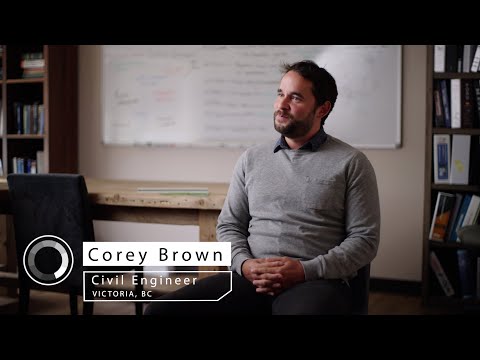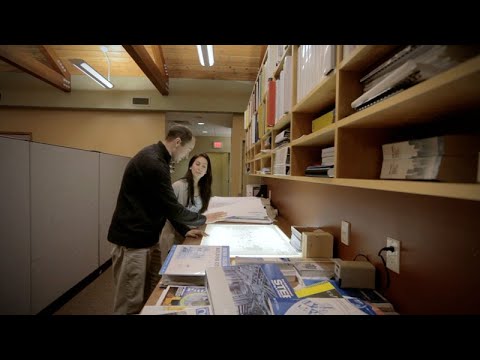Career Overview
Civil engineers plan, design, develop and manage projects for constructing or repairing building structures and systems. This includes:
- Buildings
- Earth and water retaining structures
- Roads, bridges and tunnels
- Airports
- Railways and rapid transit facilities
- Canals and dams
- Ports and coastal systems
- Systems related to highway transportation services, water distribution, and sanitation
Civil engineers work in a wide range of industries including construction, transportation, waterways and utilities. People in this job can work for both the private and public sectors, which includes engineering consulting companies, construction firms, and government organizations. Civil engineers can work as employees for a company or can be self-employed.
Civil engineers may specialize in foundation analysis, building and structural inspection, surveying, geomatics and municipal planning.
Job Titles
Duties
In general, civil engineers:
- Work with clients and other members of the engineering team
- Research and identify project needs
- Plan and design large projects such as buildings, roads, highways, bridges, dams and waste management systems
- Review and approve designs, calculations and cost estimates
- Create construction guidelines and procedures and make sure that plans meet building code requirements and other regulations
- Review and recommend project materials
- Approve proposals for construction projects and prepare contracts
- Supervise technicians, technologists and other engineers
- Organize and oversee construction work schedules
- Act as the project or site supervisor for land survey or construction work
- Investigate the feasibility of a project, prepare economic analyses reports, carry out municipal and regional traffic studies, and environmental impact studies
- Oversee air, water and soil quality, and develop processes to clean up contaminated sites
- Prepare reports, including those about technical survey and field data on the topographic (natural land features) and hydrological (natural water features) before development
Earnings
Earnings is income that workers receive in exchange for their labour. Depending on the type of employment, earnings can be in the form of wages (hourly), salaries (fixed monthly or annual) or self-employed earnings.
Work Environment
# Workers Employed
9,315% Employed Full Time
75%Work is usually performed in an office, but civil engineers also visit outdoor work or project sites. A civil engineer must be able to work in various weather conditions. A civil engineer’s office can be at their employer’s place of work, a client’s office, or a home office. Access to technology makes working from home easier because people in this job can complete most of their work remotely. They often attend project planning and review meetings either in person or by remote conference call.
A civil engineer usually works regular office hours (Monday to Friday), but large projects may require the civil engineer to work evenings and weekends to meet deadlines.
Career Pathways
Additional education and experience from working on a range of projects provides the necessary opportunities to move into supervisory or senior positions. Some civil engineers reported their first jobs were working for companies on big projects, before gaining enough experience to open their own civil engineering consulting firms.
Occupational Interests
It’s important to understand what kinds of occupations align with your interests.
For more about occupational interests visit Skills for the Future Workforce > Characteristics.
Here are the top occupational interest(s) for this career profile:
Education, Training and Skills
People in this career need a bachelor's degree in civil engineering or in a related engineering discipline. For some jobs, a master's degree or doctorate in a related engineering discipline is also required.
Licensing by a provincial or territorial association of professional engineers is required to approve engineering drawings and reports, and to practise as a Professional Engineer (P.Eng.). For a Professional Engineer to obtain a licence to work, the person must have graduated from an accredited program in engineering and pass a professional practice examination that covers the law and ethics of the engineering practice in Canada.
Some employers may require people in this job to have Leadership in Energy and Environmental Design (LEED) certification, which is offered by the Canada Green Building Council.
Civil engineers who are certified for that occupation by a regulator elsewhere in Canada can apply for the same certification from the regulator in B.C. Under the terms of the Canadian Free Trade Agreement (CFTA), most applicants who are transferring their credentials from elsewhere in Canada will not be required to complete additional training or testing. However, the B.C. regulator may ask applicants to provide further information such as a letter of good standing, references, or criminal record check.
For those who trained outside of Canada and never received certification from any Canadian jurisdiction, a full assessment is likely needed. Most occupational regulators have a process for assessment and recognize internationally trained applicants.
Contact the Engineers and Geoscientists B.C. for details on how to apply for certification in B.C.
For information about labour mobility in Canada, visit www.workersmobility.ca.
View a list of Professional Regulatory Authorities in B.C.
Education programs in B.C.

Top Skills
Every job calls for a certain set of skills. Knowing those skills is the first step in finding a good career fit.
Here, you will find the 10 most relevant workplace skills. Some are more important to achieving success in a certain career than others. These skills may come naturally to you or you may need to gain them through education, training and experience.
See the list of work-related skills below, ranked in order of importance for this career. Check out the list and see if this career matches your skills—take that first step!
Understanding written sentences and paragraphs in work-related documents.
Using logic and reasoning to identify the strengths and weaknesses of alternative solutions, conclusions or approaches to problems.
Talking to others to share information effectively.
Giving full attention to what other people are saying, taking time to understand the points being made, asking questions as appropriate, and not interrupting at inappropriate times.
Being able to solve novel, ill-defined problems in complex, real-world settings.
Communicating effectively in writing as appropriate for the needs of the audience.
Considering the relative costs and benefits of potential actions to choose the most appropriate one.
Using mathematics to solve problems.
Determining how a system should work and how changes in conditions, operations and the environment will affect outcomes.
Managing one’s own time and the time of others.
Labour Market Statistics
Discover data, facts and information that have been gathered and analyzed. Learn about the characteristics of the economy and labour market in B.C.
Employment
Find out about employment types and trends by region and industry.
Employment
9,315Employment by Region







| Region | Employment | % Employment of this Occupation |
|---|---|---|
| Cariboo | 160 | 1.7% |
| Kootenay | 175 | 1.9% |
| Mainland/Southwest | 6,740 | 72.4% |
| North Coast and Nechako | 100 | 1.1% |
| Northeast | 85 | 0.9% |
| Thompson-Okanagan | 865 | 9.3% |
| Vancouver Island/Coast | 1,195 | 12.8% |
Labour Market Outlook
The B.C. Labour Market Outlook is a 10-year forecast of the expected supply and demand for labour in the province. It’s usually updated every year. The purpose is to provide British Columbians with the knowledge to make informed decisions on careers, skills training, education and hiring.
Forecasted Job Openings (2025-2035)
3,920Forecasted Job Openings
Forecasted Employment Growth Rate
Composition of Job Openings
Job Openings by Region (2025-2035)







| Region | Job Openings | Avg. Annual Employment Growth |
|---|---|---|
| Cariboo | 0 | -1.0% |
| Kootenay | 60 | 0.4% |
| Mainland/Southwest | 2,750 | 1.4% |
| North Coast and Nechako | 20 | 0.0% |
| Northeast | 20 | 0.7% |
| Thompson-Okanagan | 320 | 0.7% |
| Vancouver Island/Coast | 760 | 1.9% |
Industry Highlights
Learn about the opportunities in B.C.'s major industries, including employment trends, earning potential, locations of work and more.
Forecasted Job Openings by Industry
| Industry | Job Openings (2025-2035) |
|---|---|
| Professional, Scientific and Technical Services | 2,690 |
| Construction | 460 |
| Public Administration | 370 |
| Utilities | 160 |
| Manufacturing | 60 |
Insights from Industry
Civil engineers work with people with a diverse range of skills and roles on a project. Good communication skills are needed for project meetings with supervisors, clients, other employees and partners. In addition, civil engineers can be asked to present project reports to clients, government officials or the public, and at conferences.
People with this job must understand the sustainable – or green – elements related to how a project will affect the environment. Project plans need to address sustainability, the impact of the project on the environment and how it will affect the community where it is being built.
People in this career often work with others who have diverse backgrounds and skills sets, experience and knowledge, which can help the civil engineer continue to grow in their career and learn on the job.
Resources
-
Association of Consulting Engineering Companies of British Columbia (ACEC-BC)www.acec-bc.ca
-
Canadian Society for Civil Engineering (CSCE)www.csce.ca
-
Canadian Technology Immigration Network (NBSCETT)www.nbscett.nb.ca/en/new-arrivals-internationally-trained/canadian-technology-immigration-network/
-
Engineering Careerswww.engineeringcareers.ca
-
Engineering Institute of Canada (EIC)www.eic-ici.ca
-
Engineers & Geoscientists BCwww.egbc.ca
-
Engineers Canadawww.engineerscanada.ca
-
Society of Punjabi Engineers and Technologists of British Columbia (SPEATBC)www.speatbc.org
-
Technology Registrations Canada (TRC)www.technologyregistrationscanada.ca









